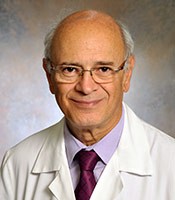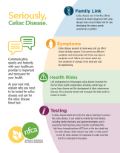A Healthy Response to Unhealthy Food: Diagnostic Testing for Wheat-Related Disorders

Event Details
Originally Aired: Monday, November 9, 2015
Time: 2-3 p.m. EST
Presenter: Stefano Guandalini, MD
Unless otherwise noted, P.A.C.E.™ accreditation will expire six months after the live webinar.
This complimentary webinar will focus on diagnostic testing for wheat-related disorders including wheat allergy, celiac disease and non-celiac gluten sensitivity. You can receive a participation certificate for this webinar through Whitehat Communications.
After attending this session, participants will be able to:
- Distinguish between wheat allergy, celiac disease and non-celiac gluten sensitivity
- Analyze and define testing requirements to aid in the diagnosis of wheat allergy and gluten-related disorders
- Advocate for accurate and timely diagnosis to improve patient’s quality of life
- Review literature to better understand the presentation of symptom, challenges of diagnosis and treatment options
The Scope of Wheat-Related Disorders
Researchers have found that there is a spectrum of gluten-related disorders, which includes diseases and conditions that result from the ingestion of gluten, a protein found in wheat, barley and rye.
This session will summarize our current knowledge about the three main forms of reactions to wheat and its byproducts including gluten and outline pathogenic, clinical and epidemiological differences.
Reaction types include:
- Allergic (wheat allergy)
- Autoimmune (celiac disease)
- Intolerance (gluten sensitivity)

Presenter
Stefano Guandalini, MD
Professor of Pediatrics, Section Chief, Pediatric Gastroenterology, Hepatology, and Nutrition, University of Chicago
Founder and Medical Director, University of Chicago Celiac Disease Center
An internationally recognized expert on celiac disease, Dr. Guandalini created the University of Chicago Celiac Disease Center in response to the low rate of detection of this disease. The way celiac disease is diagnosed and treated today has been greatly influenced by his clinical and research efforts. 20-year-old guidelines on diagnosis were revised due to his contributions and these guidelines are now used worldwide. He is also known for his expertise in the research and treatment of other diarrheal diseases in children.
NFCA Physician's Guide to Celiac Disease Data Sheet
Download this patient-directed explanation of family link, symptoms, risks and testing for celiac disease.
Thermo Scientific Phadia Data Sheet
Check out these Phadia Laboratory Systems assays and instruments for allergy and autoimmune testing, sold only through Thermo Fisher Scientific.
- Thermo Scientific Phadia Data Sheet (1.4 MB)
Thermo Scientific Allergy & Autoimmunity Product Catalog
See the full offering of autoimmune and allergy assays and instrumentation from the leader in allergy testing, Phadia Laboratory Systems.
Thermo Scientific Phadia 250 Laboratory System Data Sheet
Check out the features of the testing platform for accuracy and efficiency, along with a list of compatible ImmunoCAP and EliA tests.
More
Celiac Disease Diagnosis and Management Infographic Data Sheet
Download this easy-to-follow visual aid showing symptoms, testing and statistics concerning celiac disease created by the National Foundation for Celiac Awareness (NFCA).
Do I Have Celiac? Data Sheet
Download this patient-directed information sheet from the National Foundation for Celiac Awareness (NFCA) featuring a symptom checklist for celiac disease to bring to the doctor, plus where to find more online information and celiac disease.
- Do I Have Celiac? Data Sheet (800.9 KB)
Thermo Scientific Phadia 250: Designed for Allergy and Autoimmunity Testing Data Sheet
Discover the features, benefits and specifications for the testing system already in use in thousands of labs worldwide.
Seriously, Celiac Disease, Talking to Your Doctor Data Sheet
Download this patient-directed fact sheet from the National Foundation for Celiac Awareness about how and why to bring up testing for celiac disease with the doctor.
Seriously, Celiac Disease: Talk, Tell, Test Data Sheet
Download this patient-directed fact sheet from the National Foundation for Celiac Awareness about how a person should talk with family about celiac disease, symptoms and testing.
What Is Celiac Disease? Data Sheet
Download this patient-directed explanation of family link, symptoms, risks and testing for celiac disease prepared by the National Foundation for Celiac Awareness.
CD and gluten-related disorders: facts and fallacies
Distinguish between wheat allergy, celiac disease and non-celiac gluten sensitivity.



